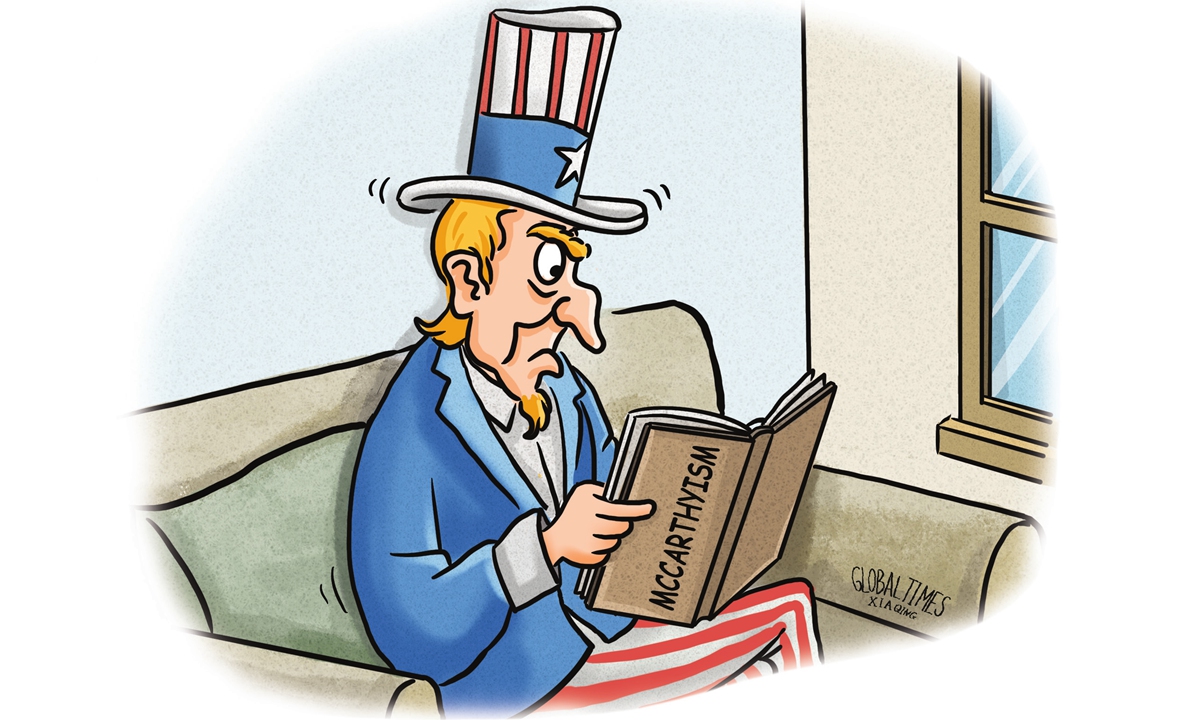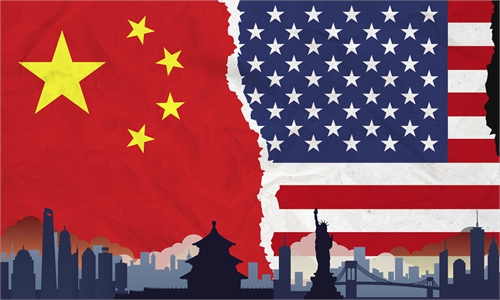
Illustration: Xia Qing/GT
Since the beginning of this year, many states in the US have successively introduced anti-Chinese measures.As of May, over two dozen US states ban China from purchasing farmland. On August 21, The Washington Post reported that lawmakers in 33 states have introduced 81 bills this year that would prohibit the Chinese government, some China-based businesses and many Chinese citizens from buying agricultural land or property near military bases. Some states have announced that they will prohibit government departments from using Chinese-made drones and other equipment.
There are three reasons that US states are addicted to hyping up China-related issues. First, the US has carried out comprehensive strategic competition against China. Since the Donald Trump administration, the US has positioned China as a competitor and proposed a whole-of-government and whole-of-society approach toward China, which has brought bilateral relations into a low ebb. The Biden administration has even continued to worsen the US' perception of China, and anti-Chinese sentiment has grown and spread rapidly to various states. When the federal government continues to use China as an imaginary enemy and calls for more domestic investment to protect the US from "threats," the states naturally see political opportunities and hope to use this to win voters' support.
Second, the extremist forces of the Republican Party have instigated anti-China waves. In the eyes of many Republicans, anti-China is politically correct with low cost and high return. Anti-China agendas are also an important political weapon for them to attack Democrats, especially during the Biden administration. The "red states" under the Republican Party have become the main force of this round of anti-China waves. For example, the China-related proposals put forward by Texas and Florida lawmakers clearly exceeded those of other states. The right-wing radical forces have even become anti-China "vanguards." US Senator Marco Rubio, who represents Florida, has long been a notorious anti-China hawk, sparing no effort to poison the atmosphere related to China at the federal and state levels.
Third, US populism colludes with racism. The election victory of Trump in 2016 marked the return of American populism, and domestic politicians have sought foreign scapegoats to shift domestic conflicts. The perception of China as the "biggest threat" to the US economy, security and way of life has entered into the minds of many people. The outbreak of the COVID-19 pandemic gave them the excuse to elevate the "China threat" to a level of racism, triggering a large number of violence against China and Asia, as well as the serious emergence of "neo-McCarthyism."
In the long run, it may have a negative impact on the US policy environment toward China and China-US relations. In this regard, we should deal with at least the following three aspects.
The first is to continue to strengthen friendly and rational exchanges with all walks of life in various states in the US, and create as many positive conditions as possible for the "unwinding" of the atmosphere of anti-China public opinion in the US. With the strategic game between China and the US becoming increasingly fierce and anti-China becoming politically correct, the "rational voice" in the US is weaker. Many people are unwilling or afraid to speak out, but these voices still exist and have certain political influence. Recently, many experts, scholars and social activists have taken the initiative to speak out, calling on the US to recalibrate its China policy and prevent the two countries from falling into war. This will help alleviate the extreme anti-China sentiment in the US to a certain extent.
The second is to actively promote people-to-people and cultural exchanges between China and the US, and promote an objective understanding of China in the US. In the context of the recent increase in high-level exchanges and contacts between the two countries, they should proceed from the common interests of the two peoples, make good use of this opportunity, actively discuss how to restart the dialogue mechanism for people-to-people and cultural exchanges, and strengthen communication in the fields of environmental protection, culture, sports, women, etc. They should promote the increase of more flights, actively hold more youth exchange activities, and provide more platforms for the younger generations of the two countries to enhance mutual understanding.
The third is to prepare plans for the anti-Chinese measures of the states in the US. For some time to come, some states may continue to hype up China-related issues, exaggerate the threat of China, step up efforts to restrict Chinese investment and business activities in the local area, and even harass Chinese people living and working there. In this regard, on the one hand, it is necessary to strengthen the evaluation of the local situation, make safety reminders in advance, and support relevant groups to protect their own rights and interests through legal channels; on the other hand, it is necessary to expose to American society and the public the attempts of relevant politicians to stir up racial conflicts for personal gains and increase their anti-China costs.
The author is deputy director of the Department for American Studies at the China Institute of International Studies. opinion@globaltimes.com.cn


